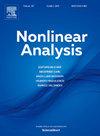Fefferman–Stein type decomposition of CMO spaces in the Dunkl setting and an application
IF 1.3
2区 数学
Q1 MATHEMATICS
引用次数: 0
Abstract
In this paper, we establish the Fefferman–Stein type decomposition of the space in the Dunkl setting. That is if and only if where and , , represent the Dunkl–Riesz transforms. Our main tool is to characterize via two approximations, which are new even for the classical space . As a direct application of our characterization of , we prove the duality of with .
Dunkl环境下CMO空间的Fefferman-Stein型分解及其应用
本文建立了Dunkl环境下CMO空间的Fefferman-Stein型分解。即f∈CMO(Rd,d)当且仅当f=f0+∑j=1dR ~ jfj,其中f0,f1,…,fd∈C0(Rd)和R ~ j, j=0,1,…,d表示Dunkl-Riesz变换。我们的主要工具是通过两个近似来表征CMO(Rd,d),这对于经典空间CMO(Rd)来说是新的。作为CMO(Rd,dω)表征的直接应用,我们证明了CMO(Rd,dω)与H1(Rd,dω)的对偶性。
本文章由计算机程序翻译,如有差异,请以英文原文为准。
求助全文
约1分钟内获得全文
求助全文
来源期刊
CiteScore
3.30
自引率
0.00%
发文量
265
审稿时长
60 days
期刊介绍:
Nonlinear Analysis focuses on papers that address significant problems in Nonlinear Analysis that have a sustainable and important impact on the development of new directions in the theory as well as potential applications. Review articles on important topics in Nonlinear Analysis are welcome as well. In particular, only papers within the areas of specialization of the Editorial Board Members will be considered. Authors are encouraged to check the areas of expertise of the Editorial Board in order to decide whether or not their papers are appropriate for this journal. The journal aims to apply very high standards in accepting papers for publication.

 求助内容:
求助内容: 应助结果提醒方式:
应助结果提醒方式:


